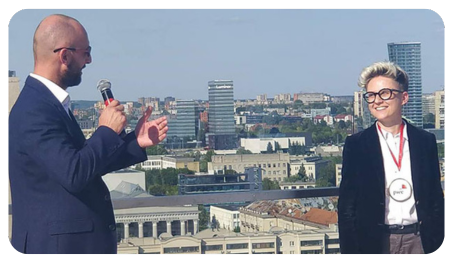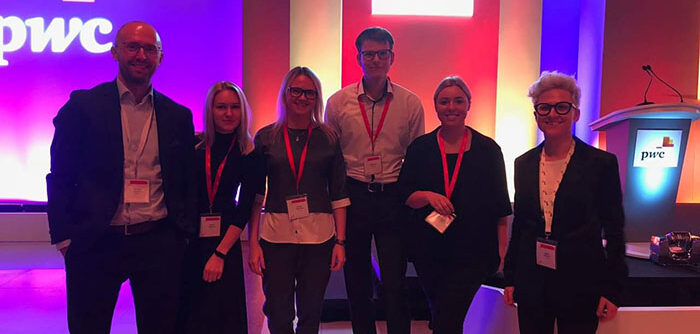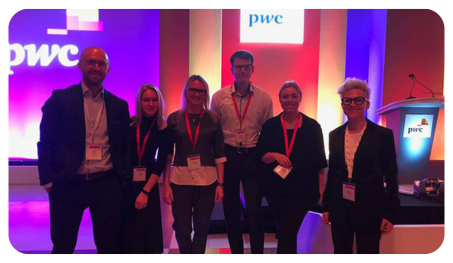Harvey John
Unit 2 Ferry Wharf
Hove Enterprise Centre
Basin Road North
Portslade, East Sussex
BN41 1BD
With so much growth in the indirect tax market as of late, there are numerous professionals making moves into upper management positions. We’ve now taken a new path in speaking to Senior Managers, Directors and Partner level professionals about their careers and ‘Becoming’ prominent figures in the industry…
I had the opportunity to speak to Aušra Miltenytė, Director of Indirect Tax and Tax Tech at PwC Lithuania about her journey to becoming a prominent part of the firm. Safe to say, it’s a path that perhaps some don’t expect to take, but develop a strong passion in.
Over to Aušra…

So, let’s start with your story, where does it begin?
My professional career in tax was one of those events in life you never expected to occur. I studied German language and literature, which had nothing to do with business, finance, or tax. Having majored in German, I was looking to move abroad and become a professional interpreter after working a temporary office job. According to an old saying, there is nothing more permanent than a temporary solution – PwC at the time was hiring an admin for the Tax & Legal department – I applied, got hired, and never left.
Starting off, my daily work included drafting general e-mails and letters. It eventually evolved into more focused work within VAT. Management must’ve seen something in me as they soon offered me a Tax Associate position just before I wanted to leave to pursue an interpreting career. I was curious, so I stayed. VAT quickly grew on me, and here I am 15 years later!
Sounds like a journey at the least! What’s life like at PwC?
Life is very dynamic at PwC Lithuania and abundant with opportunities. This is exactly what I like most about it. You have business development, which is getting increasingly interesting especially with the current shift in the tax world towards data and analytics, growing cooperation of tax authorities across the world, international data exchange, and digital developments in tax administration. There are so many new interesting opportunities you can pursue.
Being a part of a firm with a global network gives you unique access to fellow experts and technologies. You can also develop local services that involve several lines of expertise and allow you to deliver more than just traditional tax advice to clients which was used a decade ago.
I thrive on new ideas, new projects, and change in general. The only downside for me personally is the need to limit myself to several new initiatives at the same time. I’m currently working on human capital matters and developing internal technology-related projects. It’s been some time since I was only focused on indirect tax.
It’s interesting to see how you went from linguistics to an Indirect Tax Director – You have a strong interest in the industry, but how did the idea of becoming senior in the field come around? And how did you develop your passion for it?
When I was an Associate, one of our former leaders told me I would probably grow to be a good Senior Associate, but doubtfully become a Manager. Technical skills are easier to obtain than leadership and business skills; we all grow in different ways and on our own time as personalities. For me, it took quite some time, but eventually fit the bill for a senior role. Apart from my technical and professional experience, I believe my passion for people, work, and the firm got me to the position I am now in.
To get to the level you’re at, were you active in self-education and acquiring knowledge for yourself?
I had to be, and I still am. Not knowing business, law, tax, finance or accounting, I had to build it from scratch (fairly quickly!). Working mostly with VAT was challenging due to its complexities, but it was fascinating at the same time. Luckily I received on-the-job training from my colleagues and leaders who were experts.
It was also great to have attended various local courses and international training events. I was heavily engaged in constant self-study – reading legislation, tax authorities’ guidance and other sources on VAT. I even used to take EUCJ judgments on VAT with me on my lunch breaks to read. These days, my research is more focused on other competencies, I’m specifically interested in innovation, technology, and change management. And always – in personal growth.
That’s dedication! Considering the time you invest in your learning, would you say you have a daily routine?
I have a few daily routine rituals. The rest of the action during the day usually does not repeat itself. I arrive at around 9:30 am at the office unless I have meetings earlier – we have a very flexible approach to work.
I get up around six just to read a book, sip my coffee in peace and listen to my dogs snore. Mornings at home include emails, checking my schedule, chatting with colleagues on Hangouts, also speaking to clients if they call me before I’m at the office. Around five in the afternoon, I try to play foosball with my colleagues – it’s always an excellent break. Even if my team loses, I dive into work energized for a few more hours before heading home.
My daily routine is changing at the moment as I am experimenting with some ideas to raise efficiency. But I’m keeping the two routines for sure.

I suppose, in that case, it’s always beneficial to have habitual routines day to day – Do you have any advice on good working habits?
This is a topic I could talk about for days, so I will try to name only a few habits that, in my view, are valuable. Expanding your technical knowledge and keeping it sharp and up-to-date is a must, no question. This is quite simple and no tax professional can live without this. Trying not to limit yourself only to local matters helps a lot. With growing knowledge and experience in tax matters, it might be tempting to rely on your memory of the provisions of the legislation. I sincerely recommend enjoying the feeling and being proud of your growth but also reading the law and the relevant provisions – just to double-check if you are right. This is still one of my habits!
Sharing is another good habit. By proactively spreading the word on relevant developments and ideas to clients and co-workers, you can build even better relationships and networks. Also, sharing usually comes back to you bringing valuable insights and interesting opportunities.
Another habit which comes to mind is to always try to translate complicated tax matters into simple and clear messages. Being able to explain complicated matters to non-tax professionals in the most simple way is, for me, a trait of a true VAT expert. Any client or colleague will want to talk to you if you master the art of simplicity instead of creating even more work for all of those involved.
I can agree that habits create success. What do you think it takes to be in senior-level roles within Indirect Tax?
I believe nothing works without a genuine passion for what you do as an expert and a leader. Integrity is also key in any company, as the trust you build over the years with the management and your colleagues.
I think technical expertise is a small part of being ‘senior’. The ability to develop business, proactively create value, develop, lead and motivate teams, make an impact, and build and sustain meaningful, productive and long-lasting relationships with your co-workers and your clients are always key aspects of someone in senior-level roles.
Most companies have sets of skills prescribed for a relevant position. I assume in most cases, the skills evolve around the ones I mentioned.
Last but not least – you must live and breathe the values of the company, and also be able to transfer your ability to do so to others around you.
Well said! Do you have any advice you’d give to young professionals who want to drive their careers deeper into leadership roles?
I never really sought out job titles – for me, it was and still is much more important to be able to engage in activities I’m passionate about and develop myself in areas which bring value to the firm but are also interesting for me. I was happy with my job titles as long as I was able to do what I truly enjoy.
For anyone serious about excelling at their career, I’d advise you to make an inventory of your skills; and the level they are at to see what it takes to drive your career to upper levels at your company. Discuss it with your leaders, and make a plan to develop your skill set and work on it daily.
Still, I suggest not to forget that a job title may sound excellent – a promotion is always a celebration of your achievements – but it is the daily work which matters most. If the job grade you wish to achieve provides you with opportunities to work on what you truly enjoy, then the effort of working towards promotion is really worth it. But if you sense that that part of your work will be taken away from you and exchanged for other activities which you are not so fond of – think twice.
Do you have any career inspirations or professionals that you look up to?
I care about my personal development very much, mostly about my people skills these days, and I like to learn from other people. I guess I tend to look up to several professionals in a variety of fields, mostly for their abilities that I admire. From colleagues at my firm to world-famous politicians. I can be inspired equally by leaders of large teams who stay very much down-to-earth and very human, and by most junior colleagues of mine who are restless, passionate, and highly motivated to work on ideas they believe in. I mostly find myself inspired by people who care and take action for a good cause they believe in, and do not give up along the way until every stone has been turned – out of passion and determination.
Aušra, thank you so much for taking the time out of your busy schedule to speak with me about this! I’m sure many will see a lot of value in your advice. The team at Harvey John and I wish you the best moving forward with your team in 2019!
—
Are you an Indirect Tax Director? If so, we’d love to hear about your experiences and share them with our global tax network.
Search our latest tax jobs here.
If you would like to see our company updates and industry insights, follow our LinkedIn page here.
Author

From boutiques to the Big 4, and start-ups to multinational corporations, Alex manages a diverse portfolio of clients worldwide which has enabled him to develop a vast global network of indirect tax and tax technology professionals in 40+ countries.






